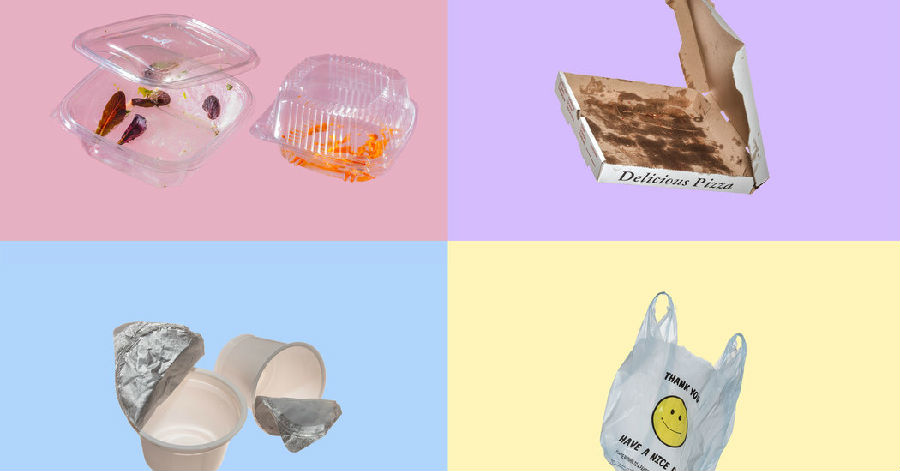(单词翻译:单击)
There is nothing like a hot cup of tea in the morning.
没有什么比早晨喝杯热茶更好的了……
That is, until I'm done, and I have to decide what to do with my cup.
直到我把它喝完,必须决定怎么处理我的杯子的时候。
Can I recycle it? Is that a trick question?
剩下的杯子可以回收吗?这个问题是不是有坑啊?
Yeah this is a great question.
这个问题问得好。
I just figure you can recycle anything that's cardboard-esque.
我以为只要是纸板做的东西就都可以回收呢。
That's not right.
你这么做是不对的。
I can't recycle this?
这个不能回收吗?
Knowing what you can and can't recycle isn't easy.
知道什么可以回收,什么不能回收并不容易。
The rules depend on where you live, and there are hundreds of products and materials where the rules aren't always clear.
因为不同的地方有不一样的规定,加上成百上千种产品和材料的回收规则都不是很清楚。
Pizza boxes.
披萨盒。
I hear that that's not recyclable.
我听说是不可回收的。
I don't know if that's like a legend, an urban legend or something.
不知道是不是传说,或者小道消息之类的。
Paper towels.
擦手纸。
My roommate and I actually have this discussion where I'm like I'll throw paper towels in there
其实,我和我室友讨论过这个问题,我会直接把它们扔进回收那一类垃圾里,
and she's like ‘I don't think you can recycle them' and pick them out.
她却说,“我觉得是不能回收的”,所以会去把它们拣出来。
Like, I don't know, it's paper.
我也迷了,不是纸做的嘛。
Bubble wrap mailers.
泡泡纸。
I don't know, this is so hard!
母鸡啊,这个太难了!
The confusion means things that are actually garbage still end up in the recycling stream.
大家的困惑也意味着本来是垃圾的东西最后也进入了回收流程。
About 25% of what Americans try to recycle, can't actually be recycled.
实际上,美国人试图回收的东西有大约25%的都是不能回收的。
Waste management experts say what's going on here is something called “aspirational recycling”:
废物管理专家表示,这种情况就是所谓的“一厢情愿式回收”:
When people are unsure if an item can be recycled, they recycle it, because it feels like the right thing to do.
当人们不确定一件物品是否可以回收时,他们会选择回收它,因为感觉回收才是正确的做法。
And while our intentions are good, this behavior isn't harmless.
尽管我们的初衷是好的,但这种行为就没有那么清白了。
Even small amounts of contamination can turn entire hauls of otherwise recyclable materials into trash and the problem has been growing.
即使是少量的污染也能将整批原本可回收的材料变成垃圾,而且,这个问题一直在恶化。
The rate of recycling contamination more than doubled in the last decade.
过去十年时间,回收污染的速度就上涨了不止一倍。
So why is this happening?
那为什么会这样呢?
Well, it is at least in part due to a major shift in how Americans recycle.
嗯,至少,一定程度上是因为美国人循环利用的方式发生了重大的转变。
Beginning in the 1990s and 2000s, municipalities implemented "single stream" recycling programs.
从上世纪90年代到本世纪初,市政当局开始推行“单一流”回收方案。
Paper, metal, plastic and glass no longer needed to be sorted.
纸、金属、塑料和玻璃不用再分类回收了。
They could all live in one bin.
它们可以在一个垃圾箱里共存了。
Communities quickly adopted the practice and by 2014, 80% of all curbside recycling programs in the US were single stream.
大家很快就采纳了这一做法,到2014年,美国有80%的路边回收项目都变成单一流的了。
The problem is, there's evidence that when we put all our recycling into one bin,
问题是,有证据表明,当我们把所有的垃圾都放进一个垃圾桶时,
we're more likely to throw trash in there along with it.
我们把垃圾连带着一起扔进去的时间也多了。
Take two neighboring counties in Florida, for example:
就以佛罗里达州两个相邻的县为例:
Palm Beach County, where residents must pre-sort their recyclables, had a contamination rate of only 9 percent,
棕榈滩县的居民必须预先对可回收物品进行分类,该县回收污染的概率只有9%,
while Broward County's single-stream program had a contamination rate of 30 percent.
布劳沃德县的单一流回收的污染率则高达30%。
Single-stream recycling takes the responsibility to sort off of the individual,
单一流回收将对可回收废品进行分类这一责任从个人,
and shifts it to Materials Recovery Facilities, or MRFs,
转移到了材料回收机构(MRF)身上,
where trash gets sorted out from recycling by machines, but also by workers,
那些机构分类垃圾不仅要靠机器,也要靠人,
who often have to remove waste by hand:
而这些工人经常都得手工清除回收物品上的污染物:
pizza boxes contaminated with grease, electronics that aren't processed at standard recycling facilities,
这类回收物品包括被油脂污染的披萨盒,标准回收设施不能处理的电子产品,
even the likes of Christmas lights, animal carcasses, and bowling balls.
甚至还包括圣诞彩灯、动物尸体和保龄球。
In Portland, workers remove thousands of dirty diapers every month.
在波特兰(市),工人们每个月都要清理成千上万的脏尿布。
In a perfect world, everyone would know how to recycle correctly,
如果是在一个理想的国度,每个人就都会知道如何正确地回收,
but short of that, there's something we can all start doing differently right now: Unless you are absolutely sure, don't recycle it.
但我们现在也还是可以做些改变:除非你非常确定,否则不要回收。
In fact, recycling education campaigns encourage the opposite: when in doubt, the best option may be to throw it out.
事实上,再循环教育活动倡导的跟这个(角度)恰恰相反:有疑问的时候,最好的选择可能是把它扔掉(不回收)。
Most people want to do the right thing, and sometimes the way to be a good recycler is to throw stuff in the trash.
大多数人都想做正确的事情,而有时候,明智地回收的做法就是把东西扔进垃圾桶。


